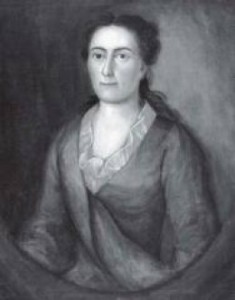I came across a memorable excerpt about the wife of 18th century preacher Jonathan Edwards. He wrote the following about his (then to be) future wife, Sarah Pierrepont, in the first page of his Greek grammar textbook:
 “They say there is a young lady [in New Haven] who is beloved of that almighty Being, who made and rules the world, and that there are certain seasons in which this great Being, in some way or other invisible, comes to her and fills her mind with exceeding sweet delight, and that she hardly cares for anything, except to meditate on him — that she expects after a while to be received up where he is, to be raised up out of the world and caught up into heaven; being assured that he loves her too well to let her remain at a distance from him always. There she is to dwell with him, and to be ravished with his love and delight forever. Therefore, if you present all the world before her, with the richest of its treasures, she disregards it and cares not for it, and is unmindful of any pain or affliction. She has a strange sweetness in her mind, and singular purity in her affections; is most just and conscientious in all her actions; and you could not persuade her to do anything wrong or sinful, if you would give her all the world, lest she should offend this great Being. She is of a wonderful sweetness, calmness and universal benevolence of mind; especially after those seasons in which this great God has manifested himself to her mind. She will sometimes go about from place to place, singing sweetly; and seems to be always of joy and pleasure; and no one knows for what. She loves to be alone, and to wander in the fields and on the mountains, and seems to have someone invisible always conversing with her.”
“They say there is a young lady [in New Haven] who is beloved of that almighty Being, who made and rules the world, and that there are certain seasons in which this great Being, in some way or other invisible, comes to her and fills her mind with exceeding sweet delight, and that she hardly cares for anything, except to meditate on him — that she expects after a while to be received up where he is, to be raised up out of the world and caught up into heaven; being assured that he loves her too well to let her remain at a distance from him always. There she is to dwell with him, and to be ravished with his love and delight forever. Therefore, if you present all the world before her, with the richest of its treasures, she disregards it and cares not for it, and is unmindful of any pain or affliction. She has a strange sweetness in her mind, and singular purity in her affections; is most just and conscientious in all her actions; and you could not persuade her to do anything wrong or sinful, if you would give her all the world, lest she should offend this great Being. She is of a wonderful sweetness, calmness and universal benevolence of mind; especially after those seasons in which this great God has manifested himself to her mind. She will sometimes go about from place to place, singing sweetly; and seems to be always of joy and pleasure; and no one knows for what. She loves to be alone, and to wander in the fields and on the mountains, and seems to have someone invisible always conversing with her.”
Edwards’ description conjures up a picture in my mind of someone who lives her life coram Deo (“before the face of God’), always aware of God’s ever presence, in daily communion with Him. What an inspiring picture.
Quotation is excerpted from George Marsden’s Jonathan Edwards: A Life.

